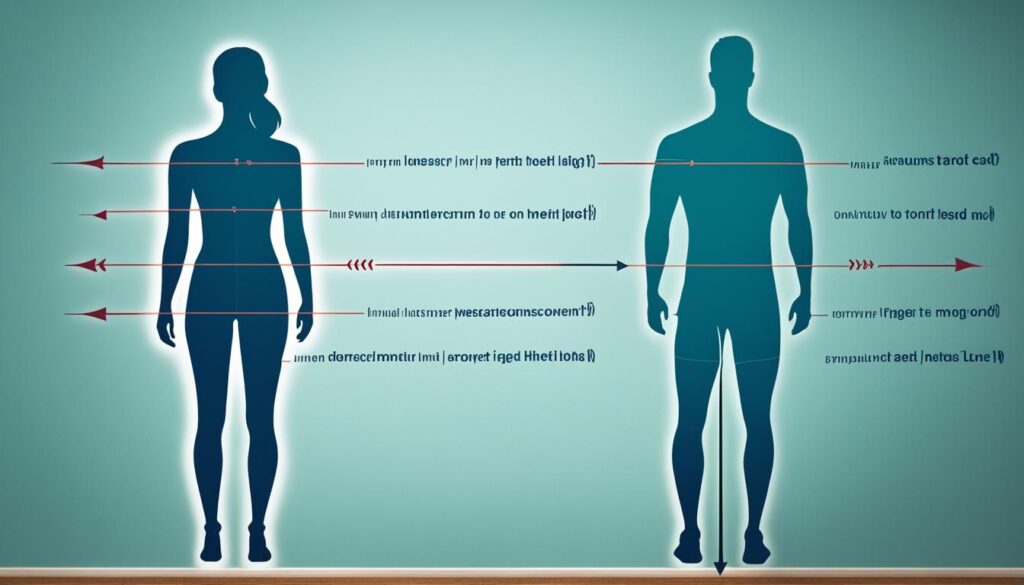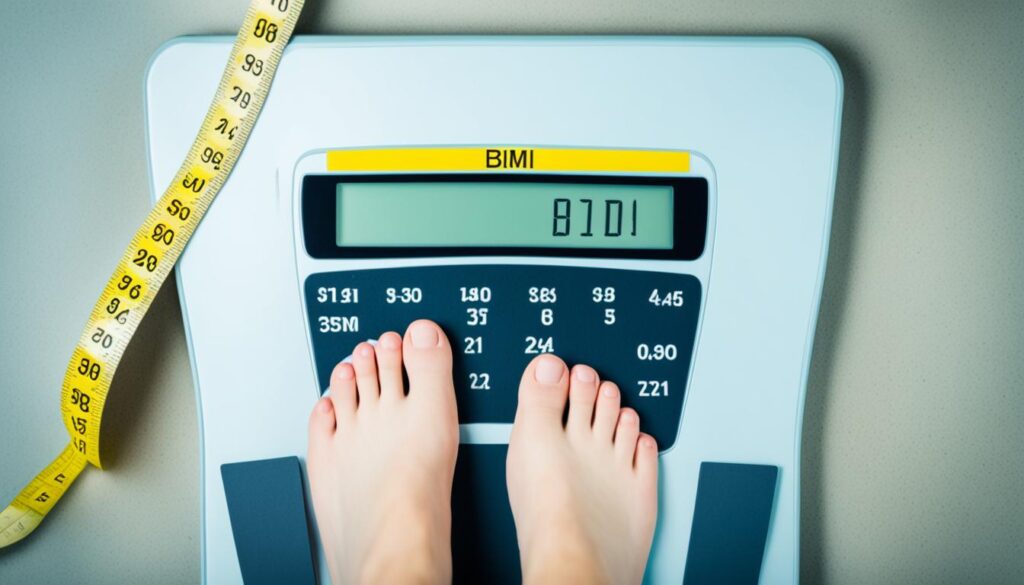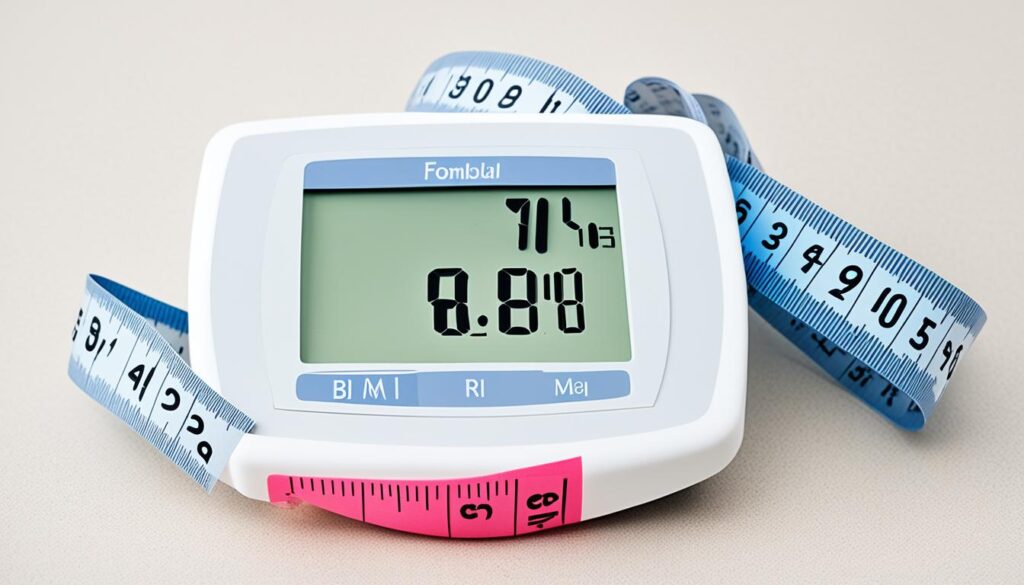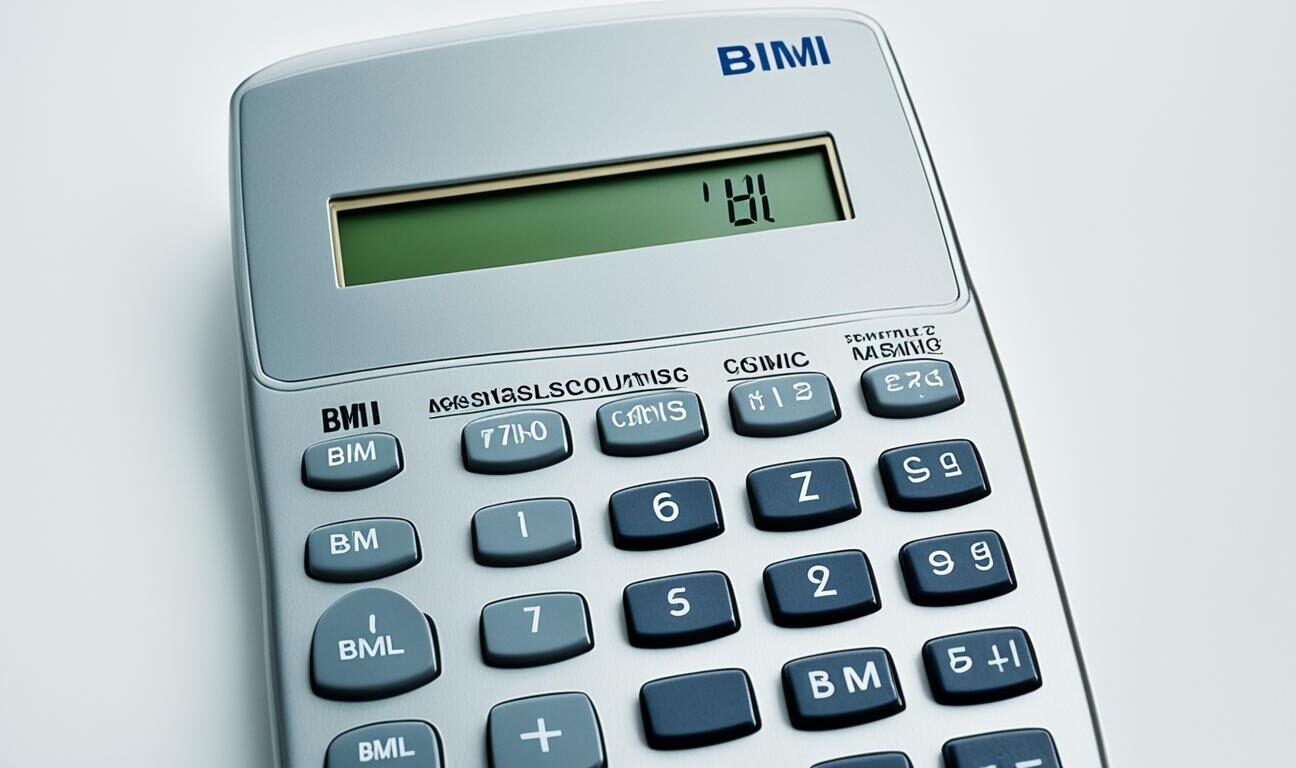Body Mass Index (BMI) is a key tool for checking your health and weight. As a healthcare expert, I know how crucial it is to get your BMI right. This guide will show you how to calculate your BMI and what the results mean.
Key Takeaways
- BMI is a simple and widely used metric to assess your body weight in relation to your height.
- Calculating your BMI accurately involves measuring your height and weight correctly.
- Understanding your BMI can provide insights into your overall health and weight status.
- BMI is just one tool in assessing your health, and additional factors should be considered.
- Consult with a healthcare professional for personalized guidance on your BMI and overall health.
Introduction to BMI
Body Mass Index (BMI) is a key tool for checking your health and weight status. It’s a simple way to see if you’re at a healthy weight or not. Knowing your BMI helps you understand health risks and guides you to a balanced life.
What Is BMI and Why Is It Important?
BMI is a common method to gauge your body composition and health. It’s found by dividing your weight in kilograms by your height in meters squared. This easy formula lets you quickly figure out your BMI, making it a handy weight management tool.
Knowing your BMI is key because it shows your risk for health issues like heart disease, type 2 diabetes, and some cancers. If your BMI is not in the healthy range, it might mean you need to change your diet and exercise habits to get to a healthy weight range.
Understanding the Formula for BMI Calculation
The BMI formula is straightforward: BMI = weight (in kilograms) / height (in meters) squared. To find your BMI, measure your height and weight correctly, then use the formula.
After getting your BMI measurement, compare it to the BMI categories. This tells you where you stand and helps you manage your weight. It ensures you keep a body mass index that supports your health and well-being.

Gathering the Necessary Information
To figure out your BMI, you need your height and weight. These are the main things you’ll use to find your body mass index. This helps you understand your body’s health better.
It’s important to measure your height and weigh yourself often. This is key for tracking your health and fitness. By watching these numbers, you can see how your body changes over time. This helps you make better choices for your health.
- Use a wall-mounted stadiometer or a portable height rod to measure your height accurately.
- Step on a digital or mechanical scale to weigh yourself. Make sure the surface is flat and the scale is correct.
- Keep track of your height and weight by writing them down or using a fitness app.
“Regularly measuring and recording your height and weight is the first step toward understanding your body’s overall health and fitness.”
With your height and weight ready, you can easily calculate your BMI. This gives you important info about your health assessment. It shows where you might need to make some changes.

Measuring Your Height Correctly
It’s important to measure your height right to get your body mass index (BMI) right. Here are some easy steps to follow for an accurate height measurement:
- Stand up straight against a flat wall. Don’t slouch or bend your neck.
- Take off your shoes and any hair accessories that might get in the way.
- Use a stiff measuring tool like a wall chart or a strong ruler. Place it at the top of your head.
- Keep your eyes looking straight ahead and your heels together. Spread your weight evenly.
- Breathe normally and don’t tilt your chin or shoulders up.
Don’t guess your height or use a self-reported one. This can make your body mass index calculator results wrong. By measuring height accurately, you’ll get the right info for your proper height measurement and BMI.

“Accurate height measurement is the foundation for a reliable body mass index calculation.”
Weighing Yourself Accurately
It’s important to measure your weight correctly to figure out your body mass index (BMI). This is a key way to check your health. Here are some easy steps to get an accurate weight measurement:
- Use a reliable digital scale. Analog scales can be less precise and more prone to errors.
- Weigh yourself first thing in the morning, before eating or drinking, for the most consistent results.
- Wear lightweight clothing, or even weigh yourself naked, to eliminate any unnecessary weight.
- Make sure the scale is placed on a flat, hard surface. Soft or uneven floors can affect the reading.
By taking the time to weigh yourself properly, you can be sure your body mass index calculation is right. This gives you important info about your health and fitness.
“Accurate weight measurement is the foundation for understanding your body composition and overall health.”

Remember, being consistent is key when weighing yourself. Stick to the same routine and use the same scale to track your progress better over time.
Performing the BMI Calculation
Calculating your body mass index (BMI) is easy with your height and weight. Just follow these simple steps to find your BMI. This will give you insights into your health and wellness.
Step-by-Step Guide to Calculating BMI
To calculate your BMI, follow these steps:
- Change your height from feet and inches to meters. For example, if you are 5’10” tall, your height in meters would be 1.78 m.
- Divide your weight in pounds by your height in meters squared. For instance, if you weigh 165 lbs and are 1.78 m tall, the calculation would be: 165 ÷ (1.78 × 1.78) = 23.1.
- The resulting number is your BMI.
The BMI formula is a simple way to calculate BMI. By using your height and weight, you can find your body mass index. This helps you make better health and wellness choices.
“Calculating your BMI is a quick and effective way to get a snapshot of your overall health.”
Remember, BMI is just one tool to look at your health. It’s key to talk to a healthcare professional for a full view of your health and well-being.

Interpreting Your BMI Result
After calculating your body mass index (BMI), it’s time to see what it means. The BMI categories help you know if your weight is healthy or if you need to make changes. They guide you on whether your weight is in a healthy range or if you should work on it.
BMI Categories and Weight Ranges
The BMI categories are as follows:
- Underweight: BMI under 18.5
- Healthy Weight: BMI between 18.5 and 24.9
- Overweight: BMI between 25 and 29.9
- Obese: BMI 30 and above
Knowing your BMI category helps you see if your weight is in the healthy range. If not, it’s time to think about how to manage your weight. A healthy weight range means you’re at a lower risk of health problems and feel your best.
| BMI Category | BMI Range | Health Implications |
|---|---|---|
| Underweight | Less than 18.5 | Increased risk of malnutrition, osteoporosis, and other health problems |
| Healthy Weight | 18.5 to 24.9 | Reduced risk of health issues and optimal overall health |
| Overweight | 25 to 29.9 | Increased risk of heart disease, high blood pressure, and type 2 diabetes |
| Obese | 30 and above | Higher risk of chronic health conditions, including heart disease, stroke, and certain types of cancer |
Understanding your BMI category and weight range helps you take steps to manage your weight and live a healthy life. This info is key in your weight management plan.

calculate BMI, BMI calculator, body mass index, healthy weight
Calculating your BMI is a simple way to check your body composition and spot health risks. It’s useful for keeping a healthy weight or managing your weight. Our BMI calculator is easy to use and gives you important insights.
To use the BMI calculator, just enter your height and weight. The tool will quickly calculate your BMI and tell you your weight status. You’ll see your BMI value and what weight category you’re in, like underweight, healthy, overweight, or obese.
Knowing your BMI helps you make smart health choices. It shows your weight range, helping you aim for a healthy body composition. This is key to lowering the risk of serious health issues like heart disease, diabetes, and some cancers.

BMI is just one way to look at your health. Always talk to a healthcare expert, like a doctor or dietitian, for a full health check. They can help you understand your body better and create a plan for your weight if needed.
Start your path to better health with our BMI calculator today. Find out your BMI, see the weight ranges, and get insights to help you reach a healthy weight.
Limitations of BMI
The body mass index (BMI) is often used to check health, but it has its limits. It doesn’t look at muscle mass, bone density, or body fat percentage. These factors can greatly affect health and fitness.
BMI can’t tell the difference between fat and muscle. An athlete might have a high BMI but be very healthy because of their muscle. On the other hand, someone with a low BMI could still have a lot of body fat, which is unhealthy.
Factors BMI Doesn’t Consider
- Muscle mass: BMI doesn’t know that muscle is heavier than fat. This means athletes or those with a muscular build might have a high BMI. But they’re actually very healthy.
- Body fat percentage: BMI doesn’t show how much body fat someone has. This is key to knowing health risks like heart disease and diabetes.
- Bone density: People with denser bones, like those who exercise a lot, might have a high BMI but are not at higher health risk.
- Age and sex: BMI changes with age and sex. It might not show the best weight range for everyone.
To really understand your health and fitness, look at more than just BMI. Consider body composition, waist circumference, and fitness tracking data. This gives you a full view of your health risks and helps you make a plan for staying healthy.

“BMI is a helpful tool, but it shouldn’t be the only way to check health and fitness. It’s important to look at everything, including body composition, lifestyle, and personal goals.”
BMI and Body Composition
BMI gives a basic idea of your weight status, but it doesn’t tell the whole story. It doesn’t separate muscle mass from fat mass. So, someone with a lot of muscle might have a high BMI but not be overweight. On the other hand, someone with more fat and less muscle could have a “healthy” BMI but still be unhealthy.
To really understand your health, look at your body composition, not just your BMI. Body composition shows the mix of fat, muscle, bone, and other parts that make up your weight. This gives you a clearer picture of your fitness level and helps you make better health choices.
| Metric | Healthy Range |
|---|---|
| Muscle Mass | 38-54% for men, 28-39% for women |
| Body Fat Percentage | 8-19% for men, 21-33% for women |
Looking at your body composition helps you see your health and fitness better. It guides you in managing your weight and choosing the right exercises.

“Focusing on body composition, not just BMI, is the key to understanding your overall health and fitness level.”
Using BMI for Weight Management
Body Mass Index (BMI) is a key tool for managing your weight. It helps you understand your weight range and set realistic goals for a healthy body. Whether you want to lose weight, build muscle, or keep your current weight, BMI tracks your progress and guides you towards your health goals.
Setting Realistic Goals with BMI
Setting achievable weight goals is crucial for managing your weight. BMI shows your ideal weight range based on your height. This makes it easier to create a plan to reach your healthy weight goals while staying fit and well.
- Identify your current BMI and the corresponding weight range
- Determine a realistic target BMI or weight range that aligns with your health and lifestyle
- Create a sustainable plan that combines weight management strategies, such as balanced nutrition and regular exercise
- Monitor your progress regularly and make adjustments as needed to achieve your BMI and fitness objectives
Remember, the key to successful weight management is setting achievable goals and working towards them consistently. Using BMI as a tool helps you maintain a healthy weight and enjoy better health.
Maintaining a Healthy BMI
Keeping a healthy BMI is key for feeling good. A balanced life with good food and exercise helps you reach and keep your ideal BMI. This also boosts your health and wellness.
Diet and Exercise Tips
Here are some tips for a healthy BMI:
- Eat a mix of whole, nutrient-rich foods like fruits, veggies, whole grains, lean meats, and healthy fats.
- Reduce processed, high-calorie, and low-nutrient foods to help manage your weight.
- Do both cardio and strength training, aiming for 150 minutes of moderate activity each week.
- Drink lots of water all day.
- Get advice from a dietitian or nutritionist for a plan that fits your health goals.
These changes help you keep a healthy BMI. They also boost your wellness metrics and support a lasting diet and exercise plan for a maintain healthy BMI.
“Consistency is key when it comes to maintaining a healthy BMI. By making small, sustainable changes to your diet and exercise habits, you can achieve your wellness goals and improve your overall health.”
BMI for Children and Teens
Calculating BMI for kids and teens is different from adults. It looks at their age and gender. This makes sure their weight status is right. It’s key for parents and doctors to watch a child’s BMI as they grow.
Understanding Pediatric BMI
The BMI formula for kids and teens includes their age and sex. This is because their weight and height change a lot as they grow. BMI charts for kids give percentiles for their age and gender. These help see if a child’s BMI is healthy.
Tracking BMI for Healthy Growth
Checking BMI often is important for kids and teens. Doctors use BMI charts to see how a child is growing. They can spot any big changes in weight. This helps them help the family keep the child healthy.
Interpreting Pediatric BMI Results
- Underweight: BMI less than the 5th percentile for their age and sex
- Healthy Weight: BMI between the 5th and 85th percentile for their age and sex
- Overweight: BMI between the 85th and 95th percentile for their age and sex
- Obese: BMI greater than or equal to the 95th percentile for their age and sex
These guidelines are general. A doctor should check the best BMI range for a child or teen. This depends on their growth and health.
| Age | Underweight | Healthy Weight | Overweight | Obese |
|---|---|---|---|---|
| 2 to 5 years | Less than the 5th percentile | 5th percentile to less than the 85th percentile | 85th to less than the 95th percentile | Equal to or greater than the 95th percentile |
| 6 to 11 years | Less than the 5th percentile | 5th percentile to less than the 85th percentile | 85th to less than the 95th percentile | Equal to or greater than the 95th percentile |
| 12 to 19 years | Less than the 5th percentile | 5th percentile to less than the 85th percentile | 85th to less than the 95th percentile | Equal to or greater than the 95th percentile |
By knowing and watching BMI for children and teens, parents and doctors can help kids stay at a healthy weight for kids. This supports their growth and health.
BMI and Health Risks
Your body mass index (BMI) is more than just a number. It tells you a lot about your health and well-being. BMI shows your body composition and links to health risks that affect your life quality.
Conditions Associated with High or Low BMI
People with a BMI over 25 face a higher risk of chronic conditions. These include:
- Type 2 diabetes
- Heart disease
- High blood pressure
- Certain types of cancer
Those with a BMI under 18.5 may also face health issues. These can be:
- Nutritional deficiencies
- Weakened immune system
- Osteoporosis
- Fertility issues
Keeping a healthy BMI, between 18.5 and 24.9, lowers chronic disease risk. It’s key for your well-being. Knowing BMI’s link to health risks helps you manage your weight and boost your health.
“Achieving and maintaining a healthy BMI is a crucial step in preventing and managing a wide range of chronic health conditions.”
When to Consult a Healthcare Professional
Understanding your BMI is a key step in checking your health. But, it’s important to talk to a doctor or dietitian for a full health check. They can give you advice based on your BMI, body type, and health. This helps you make a plan to stay at a healthy weight.
Here are times when you should talk to a healthcare professional:
- If your BMI shows you’re underweight or overweight/obese.
- If you’re worried about your body fat percentage or muscle mass.
- If health problems like high blood pressure, diabetes, or joint pain are linked to your weight.
- If you’re starting a new exercise or diet plan and need help setting goals.
A healthcare professional can give you personalized guidance on what to do with your BMI and health. They can help you make a plan that covers your weight, nutrition, exercise, and lifestyle.
“Regular check-ups with a healthcare professional can help you monitor your progress and make adjustments to your plan as needed, ensuring you achieve and maintain a healthy weight in a safe and sustainable manner.”
Talking to a healthcare professional gives you important advice and support. This helps you manage your health and weight better, based on what you need and your situation.
Conclusion
In this guide, I’ve shown you how to calculate your body mass index (BMI) and what it means for your health. You can now understand your fitness level by following the steps and using the BMI calculator. This tool gives you important info about your health.
BMI is just one way to look at your health. It’s important to think about other things like body composition and overall health too. If you have questions or need advice, talk to a healthcare professional. They can help with your BMI, health, and weight management.
Keeping a healthy BMI is key for your well-being. This guide has given you the tools and info to do that. I hope you’ll keep working on a healthier lifestyle. Stay updated on new info about BMI and weight management.







Leave feedback about this